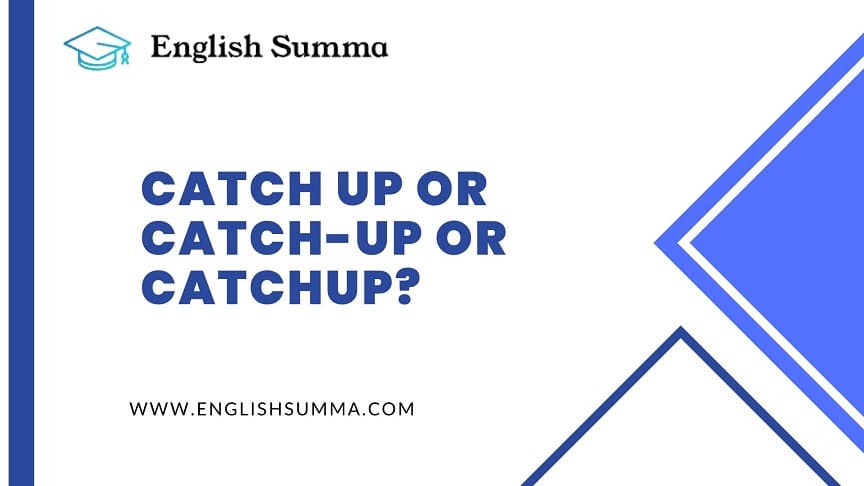The phrases “catch up,” “catch-up,” and “catchup” are often used interchangeably in English, but they have distinct meanings. Understanding the differences can help ensure you choose the right form for the context.
Catch Up as a Phrasal Verb
“Catch up” written as two words is a phrasal verb. Phrasal verbs are verbs combined with adverbs or prepositions to create new meanings.
Some examples of using “catch up” as a phrasal verb:
- I was falling behind in my work, so I had to catch up over the weekend.
- She started running faster to try to catch up to the race leader.
- My friend moved to a new city last year, so when she visited, we had a long talk to catch up.
In these sentences, “catch up” means to reach or overtake someone or something, or to become up-to-date. The key is that it describes an action.
Read More: Fulltime or Full-Time or Full Time?
Catch-Up as a Hyphenated Compound
When written as one word with a hyphen (“catch-up”), it functions as a compound adjective or noun.
Some examples:
- I scheduled a catch-up call with my client to go over the project status.
- My son has catch-up immunizations scheduled next month since he’s behind on his shots.
- I hope this extra tutoring will prevent my daughter from needing catch-up work this summer.
In these sentences, “catch-up” describes the purpose or nature of the call, immunizations, or work. The hyphen connects the two words to show they function as a unit to form the compound term.
Catchup as a Noun
Written as one word without a hyphen (“catchup”), this functions as a noun meaning a period of catching up on something.
For example:
- The first month after my maternity leave was a catchup period to get up to speed on all the projects at work.
- I scheduled a catchup with my manager to discuss my career goals next quarter.
In these cases, “catchup” refers to the actual event or time period of catching up. The single word signals it is acting as a noun.
Read More: In Person or In-Person?
When to Use Each Form
Because “catch up,” “catch-up,” and “catchup” have distinct meanings, it’s important to use the right variation for your intended meaning.
Use “catch up” (two words) when using it as a phrasal verb to describe an action. Additionally, use “catch-up” (hyphenated) when using it as a compound adjective or noun. You can also use “catchup” (one word) when referring to a noun meaning a period of catching up.
Real-World Examples
Let’s look at some examples of how these forms may be used in sports reporting:
In the cycling race, Lopez struggled on the uphill climb, causing her to fall behind the lead group. She made a valiant effort to catch up on the downhill section. Despite her attempts to catch up, Lopez lost significant time and finished well behind the leaders.
After injury kept him sidelined for several games, Wilson used the team’s bye week for catch-up training to improve his fitness. The coach hopes this catch-up period will help Wilson regain his top form.
Martinez has scheduled one-on-one catchup sessions with each player to get their feedback on the season so far. These catchups will help Martinez understand areas needing improvement.
In the first example, “catch up” is used as a phrasal verb to describe Lopez’s action of trying to reach the leaders. In the second, “catch-up” shows the purpose of Wilson’s training, while in the third “catchup” refers to the meeting itself.
Read More: Well Deserved or Well-Deserved?
Using the right variation ensures clarity for the reader while demonstrating a strong grasp of English vocabulary. Whether you are writing a story or having a conversation, be conscious of when to use “catch up,” “catch-up,” or “catchup” for the context.
Key Takeaways: Catch Up vs. Catch-Up vs. Catchup
- Catch up (two words): phrasal verb describing the action of reaching or overtaking
- Catch-up (hyphenated): compound adjective or noun conveying purpose or nature
- Catchup (one word): noun meaning a period of catching up
Understanding the distinct meanings behind “catch up,” “catch-up,” and “catchup” allows for proper usage. Applying this knowledge in your writing and speaking helps avoid confusing these common phrases. Paying attention to the context and intended meaning can help you determine which form fits best.

Emily Hudson, the creative mind behind “English Summa,” is a passionate English language educator with a Bachelor’s Degree in English and a Teaching Certification. Dedicated to making the intricacies of English accessible to learners, Emily brings a blend of expertise and enthusiasm to her readers. Follow English Summa for insightful language tips, literary explorations, and a shared love for the beauty of English.

